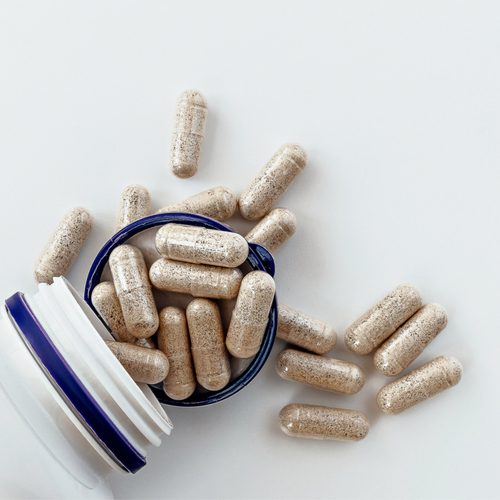
Digestive Enzymes
The proper functioning of your digestive system is one of the most important factors that determines if you will struggle with bloating and other stomach issues. “Some gas and bloating is due to a lack of certain enzymes necessary for the body to process and digest specific carbohydrates. When the digestive process slows down, one's metabolism can take a hit as well,” explains registered dietitian Trista Best. Carbohydrates are essential to the body for healthy digestion, however, corresponding enzymes must also be present to help metabolize these carbs. “If one or more of these enzymes are missing or lacking in your gut, like any of those needed to digestion the Fermentable Oligo-, Di-, Mono-saccharides And Polyols (FODMAP) carbohydrates, you can experience gas and bloating,” Best says.
Foods that may be more difficult to digest are garlic, apples, cauliflower, and even most gluten products. If you don’t wish to remove these items from your diet, integrating a digestive enzyme supplement can be useful for smoothing out digestion, easing bloat, and making it easier to lose weight over time.
Probiotic
Probiotics are well known for supporting gut health which is essential for proper digestion and the elimination of bloating and discomfort that may dwell in the belly. “One supplement that can help to reduce bloating and weight gain associated with poor gut health is a probiotic,” says nutritionist Lisa Richards. “By improving the health of your gut you are bringing balance back to your life and preventing/reducing bloat, indigestion, fatigue, nausea, gas, diarrhea, yeast infections, and general unwellness.” There are a variety of different probiotics on the market so it’s important to check with your doctor to find an option that works best for your body, but providing your gut with a probiotic supplement can make a major difference in bloating and general stomach discomfort.
Fiber
Fiber is essential for keeping your digestion regular and when your diet is lacking you may become more prone to bloating, gas, and retaining water weight. “Fiber expands in the stomach and decreases hunger hormones, helping us to feel full. While we want to get as much as possible from whole food sources such as vegetables, fruits, nuts, seeds, and legumes, fiber powders can help fill in the gaps when needed,” suggests RD Kylie Ivanir. While there are several types of fiber supplements you can try, Ivanir notes that psyllium husk is exceptional for bloating as it is a soluble fiber which can help to minimize constipation, thus reducing bloat.
Magnesium
Most diets do offer enough magnesium so as to avoid taking a supplement, but if you find yourself with a deficiency this can result in weight gain and even more serious ailments. “Magnesium is another supplement that can help with weight loss. In addition to supporting bone health, blood pressure, and nerve function, magnesium is also involved in blood sugar regulation, which can help with weight management,” explains Ivanir. If you’re struggling with bloating and constipation consistently, magnesium citrate may be a good addition to your health routine. Much like fiber it helps to absorb water during digestion, keeping your body regular and limiting bloat while also allowing for weight loss with ease.


